Nonprofits operate differently from for-profit organizations, but they still have to produce standard financial statements, such as the statement of financial position and the statement of cash flows. These reports can be challenging to create manually, but this process can be seamless with accounting software tailored for nonprofits.
Nonprofit organizations need accounting software that meets their unique needs and equips them with features like automated bank reconciliations, monthly expense reports, compliance monitoring, and tax filing. However, since not all accounting software has these essential features, how can you determine which option is best for your nonprofit?
This article explores the best accounting software options for nonprofits, highlighting their key features, pros, and cons. We’ll also offer tips on how to choose the best software for your nonprofit organization.
What is nonprofit accounting software?
Nonprofit accounting software helps nonprofits manage transactions and financial operations. It’s usually tailored to nonprofits' unique funding structures and may offer features for grant tracking, fund accounting, and donor management, which are not readily available on all accounting software.
These software solutions are designed to meet nonprofits' specific needs, ensuring compliance and transparency while simplifying financial management. However, it's important to note that many general accounting software solutions can also serve nonprofit accounting purposes.
Features of the best nonprofit accounting software
Here are some of the top features to consider in a nonprofit accounting software solution:
- Process automation: The best nonprofit accounting software should automate nonprofit accounting processes and tasks such as amortization, reconciliations, and flux analysis.
- Compliance: Any accounting software, including those for nonprofits, should support compliance with industry standards and regulations such as GAAP and IRS 990 reporting.
- Budget tracking: Budget tracking gives nonprofits an overview of their spending and balance at the end of a period. This supports efficient resource allocation and financial planning.
- Bank connections: Nonprofits often need to reconcile their accounts regularly. The best nonprofit accounting software supports bank connections to automate bank reconciliations and allows you to choose the frequency.
- Grant and donation management: Grant and donation management is a crucial part of nonprofit accounting and is equivalent to revenue management in a for-profit organization. Thus, it should be a core feature in any good nonprofit accounting software.
- Integrations: The best nonprofit accounting software supports integrations or is fully embedded with enterprise resource planning (ERP) platforms, such as NetSuite, to provide a single source of truth and ensure reliable audit trails.
- Financial reporting: Nonprofits are accountable to their donors and stakeholders, and they can demonstrate transparency with accurate financial reporting. The best nonprofit accounting software ensures that nonprofits can generate financial reports as needed.
Evaluate your accounting software with this checklist.
Best accounting software for nonprofits
Nonprofits have different needs based on their size, funding sources, and operational focus. Here are some of the best accounting software for nonprofits that address these needs, enhance efficiency, and support compliance.
1. NetCash by Netgain
Best for: Bank reconciliations and cash management
NetCash is an accounting software in Netgain’s product suite that enables businesses to gain real-time, precise, and comprehensive visibility into their cash position — directly in NetSuite. NetCash is easy to implement, with no complex setup required. You’ll get a team of NetSuite and accounting experts to ensure you smoothly integrate NetCash into your cash management strategy and processes.
NetCash uses open banking application programming interfaces (APIs) to support real-time data transfers between users’ banks and the ERP, reducing manual errors to a minimum. For audits, NetCash has prebuilt reports, ensuring that you have all the reports you need.
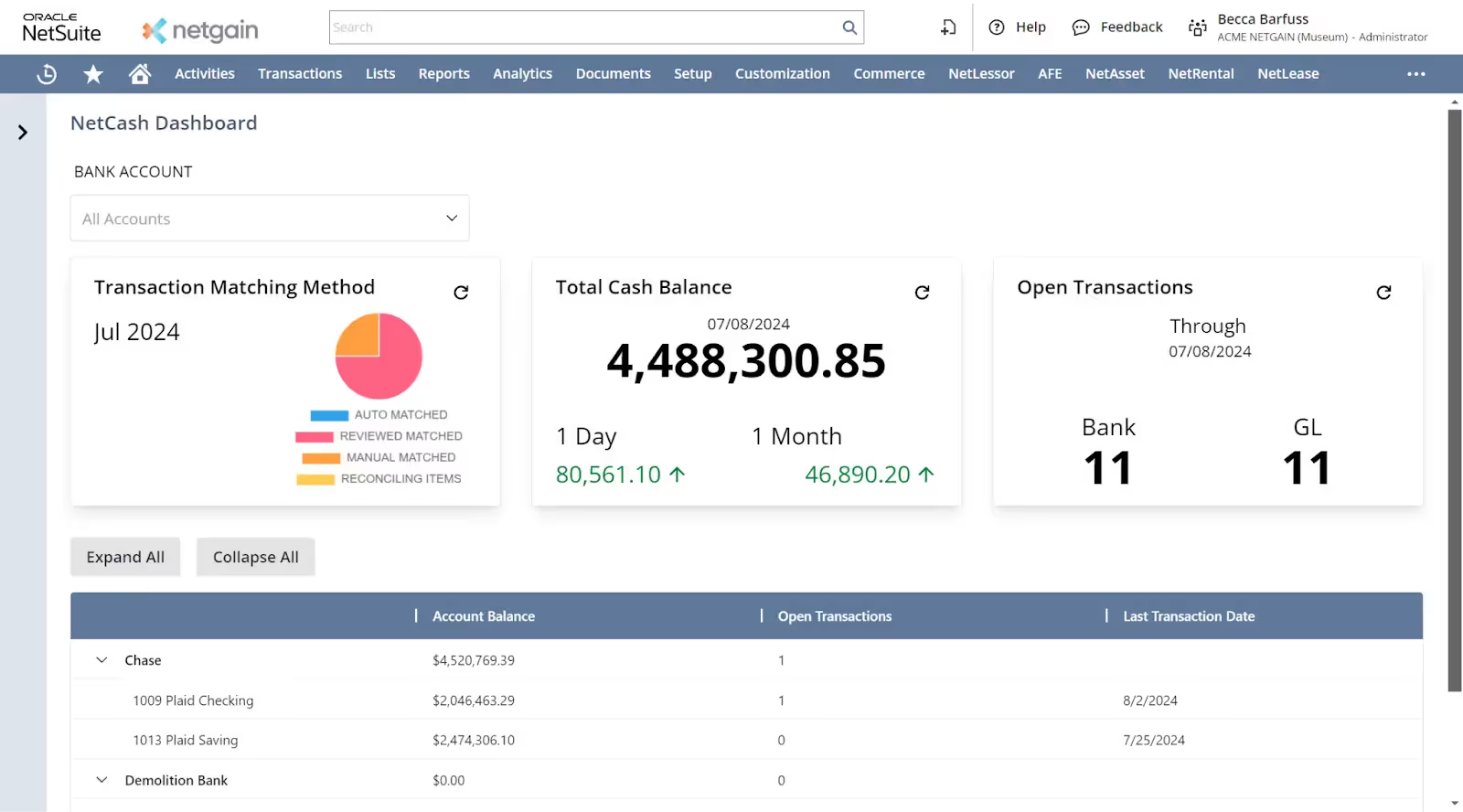
Features:
- Open banking: Connects to your bank accounts and manages all of your bank reconciliations within one platform. It allows you to automate this process by setting the frequency of reconciliations and enabling the import of bank data.
- Real-time visibility: Ensures that you don’t have to wait another month to get a report on your cash position. Instead, users get real-time, comprehensive visibility into their company’s cash position for better cash management.
- Prebuilt financial reports: Prebuilt reports ensure stakeholders have the reports they need for audits and that the management team is well-informed on the company’s financial status.
- Auto-match: Creates flexible matching rules for seamless transaction reconciliation. For transactions without a match, users can easily create journals and deposits.
Pros:
- NetCash offers automated bank imports for reconciliations.
- NetCash is simple to set up, and users can start using it right away.
- With NetCash, you can import real-time data from your bank account into your NetSuite ERP.
- Users don’t need to create reports from scratch with prebuilt reports.
Cons:
- The availability of open banking APIs varies by region. API connectivity in the US and Canada is available but limited, and regions like Africa, Asia, and Latin America have little to no API connectivity.
- NetCash is not a good option for companies who do not use NetSuite as their ERP.
Pricing:
NetCash offers custom pricing fitted to your needs.
Ready to experience the best accounting software for your nonprofit? Take a tour of NetCash.
2. NetClose by Netgain
Best for: Improving month-end processes
NetClose is a Netgain product designed to improve organizations’ month-end close processes. This software automates repetitive manual tasks such as reconciliation, amortization, and flux analysis, giving you more time to make a real impact in your organization at the end of each month.
NetClose also uses a Kanban-style workflow to manage tasks so users can easily track progress and prioritize work. Additionally, NetClose is embedded in NetSuite, so users don’t need to manually transfer data or switch between platforms. This allows users to keep all their data in one place.
NetClose also supports audits and compliance by enabling the automatic posting of journal entries to your general ledger, eliminating manual data entry tasks and increasing financial accuracy.
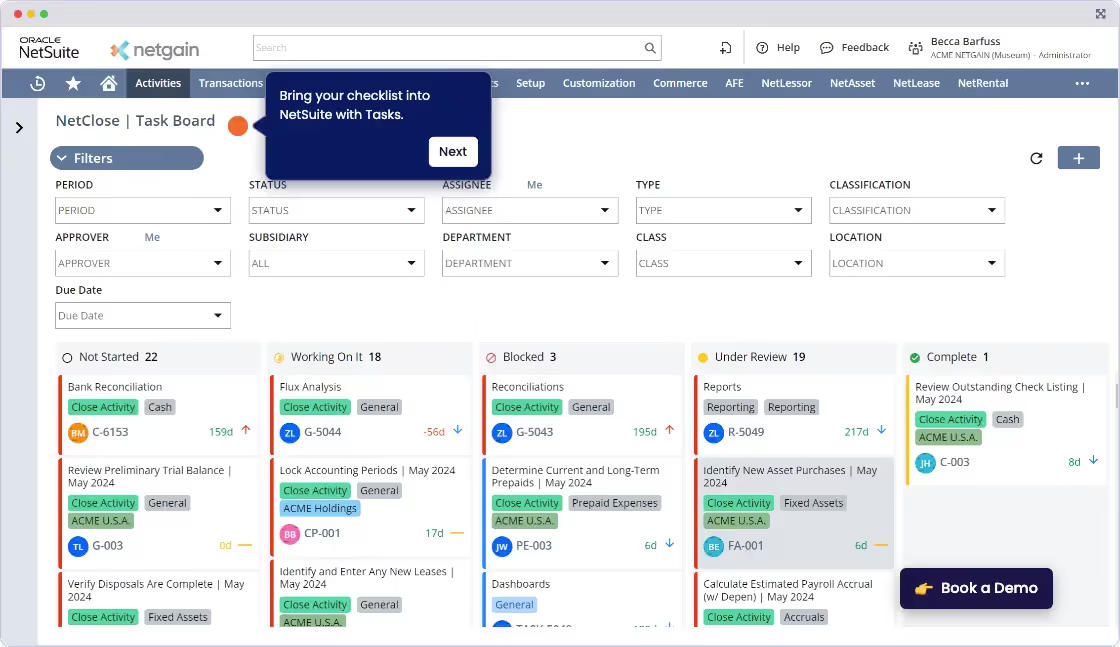
Features:
- Robust reporting: Generate month-end reports in minutes using its robust reporting feature. This includes waterfall reports and financial summaries, so users spend less time creating reports and have more time to analyze their reports.
- Task automation: Automate accounting tasks, such as amortization, reconciliations, and accruals.
- Task management: Use a Kanban-style task management system to simplify task management.
- Cross-team visibility: Gain more visibility into month-end closing processes across teams.
- Single source of truth: NetClose is embedded in NetSuite to centralize data and reports in one place, eliminating manual accounting tasks and reducing the risk of errors.
Pros:
- Users can easily assign tasks and track their progress in NetClose.
- NetClose offers enhanced visibility over month-end processes.
- Managing tasks is easy with a Kanban-style workflow.
- Using NetClose's task dashboard makes it easy to identify completed and in-progress tasks.
- NetClose is fully embedded in NetSuite, so no platform integration is needed.
Cons:
- It is not available for other ERPs aside from NetSuite.
Pricing:
NetClose offers custom pricing fitted to your business needs. Visit the website for more info.
See how NetClose works with a self-guided demo!
3. Zoho Books
Best for: Monitoring nonprofit cash and expenses
Zoho Books is an online application designed for nonprofit accounting. It allows users to work and collaborate remotely and has role-based access control for security and permissions management. Zoho Books also has a dashboard that provides an overview of your finances, including cash flow, top expenses, and projects.
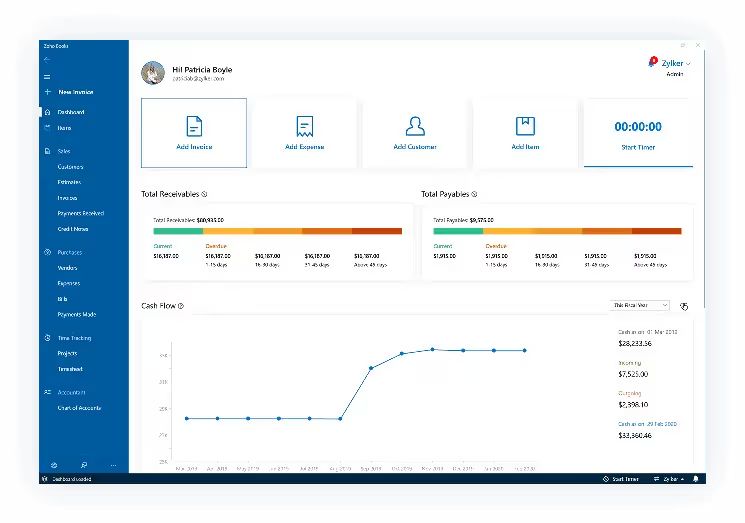
Features:
- Expense management for tracking expenses and funds across categories and creating different expense accounts to streamline budgeting
- Multicurrency donations for accepting donations from donors worldwide
- Project management feature for managing financial projects, from assigning projects to tracking and generating project reports
- Zoho Checkout for customizing payment pages
Pros:
- Staff can work from anywhere using the Zoho Books mobile application.
- It includes a dashboard for indicating cash and expense positions.
- Users can generate expense reports at any time to track spending.
- Users can customize checkout pages based on their organizational branding and needs.
Cons:
According to online reviews from Zoho Books users on G2, some users have expressed negative feedback regarding customization and data migration, including:
- Limited customization for reports and invoices
- Difficult to integrate with third-party applications aside from ZOHO applications
- Challenges migrating data and reports when handling large amounts of data
Pricing:
All subscription tiers are billed annually.
- Free: $0 (only for businesses with annual revenue of less than $50,000 USD)
- Standard: $15/org/mo
- Premium: $60/org/mo
- Elite: $120/org/mo
4. FreshBooks
Best for: Billing and creating customized invoices
FreshBooks is an accounting software that automates routine accounting processes such as invoicing, billing, and expense tracking. It allows users to create invoices with their business logo and branding and send payment reminders to clients. FreshBooks also supports automatic tax computation, categorizing expenses as they occur in real-time. It has features for creating reports such as profit or loss reports, sales tax summary, and expense reports.
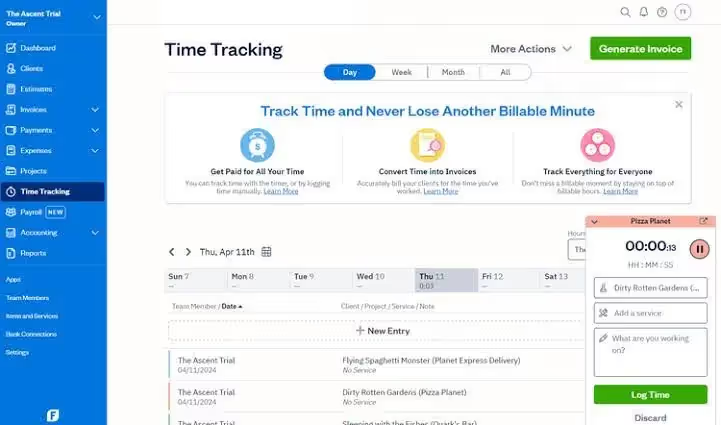
Features:
- Customizable invoices with support for sending payment reminders
- Cloud storage for organizing expenses
- FreshBooks mobile app for managing finances on the go
- Built-in dashboard for viewing financial performance
- Prebuilt reports such as profit or loss reports, sales tax summaries, and expense reports
Pros:
- Users can customize and automate invoice creation and delivery
- Supports time tracking and sending bills and invoices to clients
- Allows users to categorize their expenses
Cons:
FreshBooks still has several drawbacks based on independent user reviews on G2:
- It’s much more expensive than other comparable services.
- It is not a suitable option for businesses that depend on cash flow, as FreshBooks often locks down user funds after the client has paid.
- There’s a limited number of clients you can service with FreshBooks, even as a premium user.
Pricing:
- Lite: $5.70/mo
- Plus: $9.90/mo
- Premium: $18/mo
5. Xero
Best for: Simple accounting for small businesses
Xero is an accounting software that seeks to simplify accounting by providing support to accountants and bookkeepers. It has features for payments, invoicing, bank reconciliation, and payroll management. Xero also supports integration with third-party applications from the Xero app store, including Stripe, PayPal, and Zapier. The software allows users to connect their bank accounts for automatic bank reconciliations.
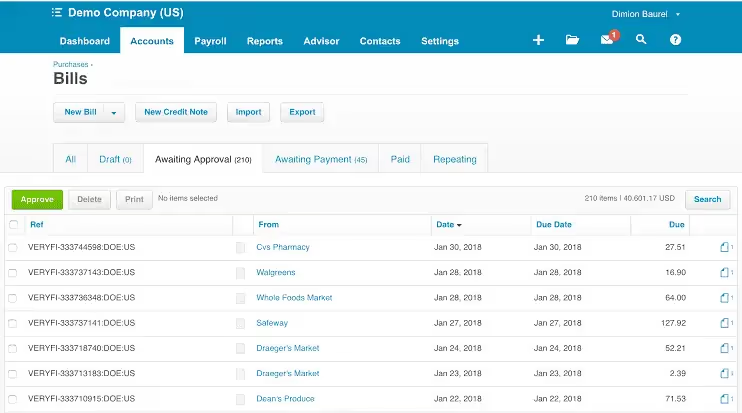
Features:
- Online invoicing with invoice reminders
- Bank connections to allow users access bank data
- Xero job tracking tool for project planning, budgeting, quoting, and invoicing
- Automatic bank reconciliations with connection to user bank accounts
- Xero’s expense management tools for expense claims
Pros:
- Users can connect their bank accounts to Xero.
- It integrates with some payment processing platforms.
- Small and medium-sized businesses can issue invoices online.
Cons:
According to online reviews on G2, there are some downsides of using Xero:
- There is a transaction limit, so bigger businesses would find it challenging to use Xero and may have to migrate.
- Users cannot open different files simultaneously.
Pricing:
- Starter: $29/mo
- Standard: $46/mo
- Premium: $62/mo
6. QuickBooks
Best for: Expense tracking and automated invoicing
QuickBooks by Intuit is an accounting software that helps small businesses track expenses, customize invoices, and run necessary reports. QuickBooks also supports tax compliance with features that track GST and VAT. It has a mobile app for users to perform basic accounting functions on the go.
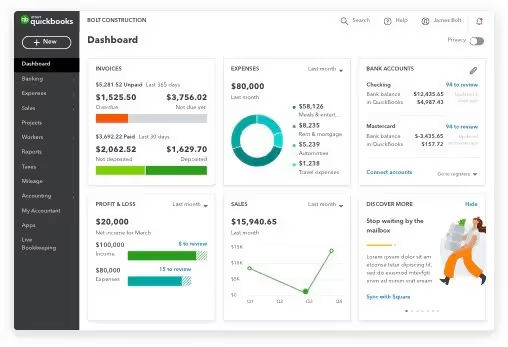
Features:
- Track income and expenses and send custom invoices and quotes.
- Connect your bank and manage bills and payments.
- Track GST and VAT for tax filing.
- Track project profitability.
- Customize dashboards and reporting fields.
Pros:
- QuickBooks is available as a mobile application.
- It helps to automatically balance bank statements.
- It has multi-currency support.
Cons:
Here are some drawbacks of using QuickBooks based on online reviews from users:
- QuickBooks does not offer a free tier.
- QuickBooks users complain about the customer support.
- Users often find customizing account ledgers challenging.
Pricing:
- Simple Start: $18/mo
- Essentials: $27/mo
- Plus: $38/mo
- Advanced: $76/mo
7. Sage Intacct
Best for: Accounting and enterprise resource planning with AI
Sage Intacct is an AI-powered cloud software that offers businesses support for accounting, payroll, and HR functions. It allows users to automate accounting processes and tasks with AI technology. Sage Intacct combines payroll, people, and accounting data so users get a unified view. Sage Intacct can also work for budget creation and monitoring.
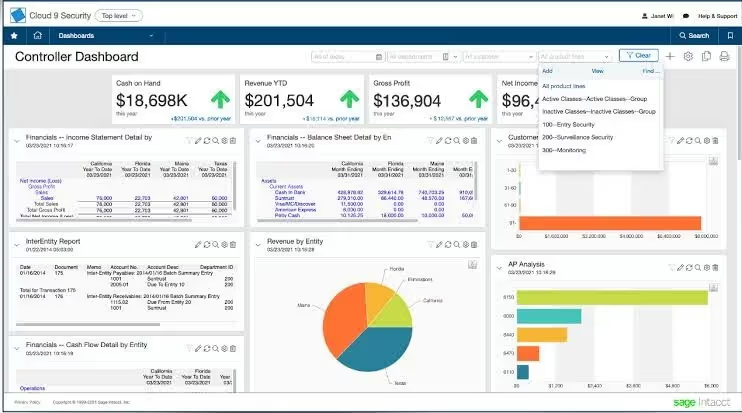
Features:
- AI-powered continuous accounting and ERP
- Automate accounts payable
- Payroll and human resources (HR) management
- Intuitive budgeting with budget monitoring
- Dashboard and reporting features for business insights
Pros:
- It’s accessible from anywhere with an internet connection.
- It uses AI technology to automate tasks.
- It helps accounting teams with budget creation and monitoring.
Cons:
Sage Intacct has several benefits, but according to online reviews from users on G2, the platform still has some drawbacks:
- It often doesn't arrange transactions chronologically, making it difficult to identify transactions based on recency.
- Users often experience difficulties viewing some ledgers.
- Users can’t run reports for custom timeframes.
Pricing:
Sage Intacct requires potential customers to request pricing details.
8. Wave Accounting
Best for: Creating invoices and receiving online payments
Wave Accounting is an accounting software for money management. It supports invoicing, payments, accounting, and payroll and gives users access to experts from Wave Accounting’s in-house team of bookkeeping, accounting, and payroll coaches. Wave Accounting also has a dashboard that displays your business health.
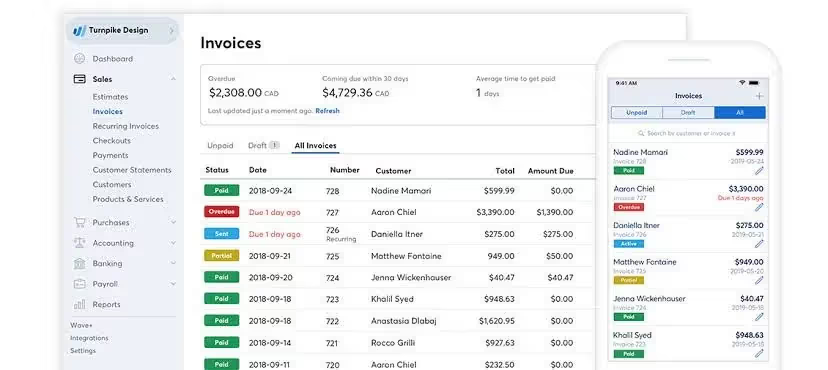
Features:
- Accept invoice payments with credit card, bank transfer, or Apple Pay
- Income and expense tracker to monitor cash flow
- Payroll software for calculating workers’ hours and wages
- Advisors to coach users on bookkeeping, payroll, and accounting
Pros:
- Wave supports billing and sending automatic invoice reminders.
- Users can import their bank statements as CSV.
- Users can add multiple accounts to the same profile.
Cons:
According to online reviews shared on G2, Wave Accounting users have had several poor experiences using the platform:
- Users often experience failed payments.
- Wave Accounting has poor customer support for resolving user complaints.
- Wave Accounting users find their dashboards confusing sometimes.
- The bank integration feature for bill payment is also not straightforward.
Pricing:
- Starter plan: Free
- Pro plan: $16/mo
9. AccuFund
Best for: Financial management for governments and nonprofits
AccuFund is a browser-based cloud accounting suite designed to offer financial management solutions for governments and nonprofits. AccuFund has a core system for managing accounting tasks such as accounts payable, bank reconciliation, and cash receipts. It also has a dashboard for real-time financial monitoring and assists users with financial reporting.
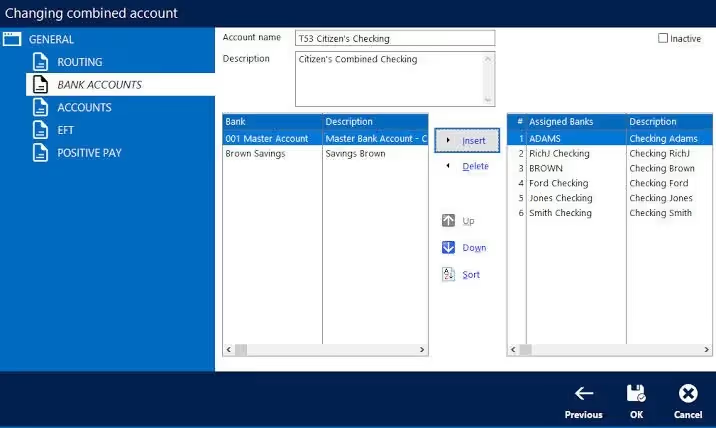
Features:
- AccuFund Core System for managing accounts payable, bank reconciliations, and cash receipts
- Smart Capture, an AI bill capture technology for paperless bill creation
- Dashboards for alerts, task management, and key performance indicator (KPI) display
- Human resource management system for employee timesheet entry
Pros:
- Users have access to dashboards for financial monitoring.
- It is a cloud-based software.
- Supports paperless timesheets.
Cons:
Despite its benefits, users experience some difficulties using the software according to G2 reviews:
- Some reporting is difficult to understand and users may need the help of consultants.
- Some users experience lagging while using the platform.
- Report writing is not intuitive.
Pricing:
AccuFund requires potential customers to request pricing details.
10. Aplos
Best for: Fund accounting for churches and nonprofits
Aplos is an online software for nonprofits and churches. It focuses on managing finances, people, and donations. Aplos has a built-in fund accounting software for donor and donation management, and it allows users to accept online donations and gifts. It also has a fully integrated dynamic customer relationship management (CRM) software for keeping track of donors and volunteers.

Features:
- Built-in fund accounting software
- Online donations and gifts management
- Donor and volunteer management with CRM
- Advanced reporting and analytics
- Email marketing and communication tools
Pros:
- Users have access to a CRM software for donor tracking.
- Supports donor management.
- It integrates with your bank account.
Cons:
Despite the benefits shared, users still experience some bottlenecks while using the platform. Here are some of the cons reported by users from G2:
- The software can get confusing for users with little knowledge of fund accounting.
- Some users have had a challenging experience with recurring transactions from donors.
- Aplos has fewer integrations compared to other accounting software like QuickBooks.
Pricing:
- Lite: $79/mo
- Core: $99/mo
- Advanced: Request pricing
11. Realm
Best for: Comprehensive church management, including payroll
Realm is an accounting software designed specifically for churches. It supports staff and payroll management and also helps users manage other church activities such as coordinating different church groups, checking in on congregation, and sharing information with members.
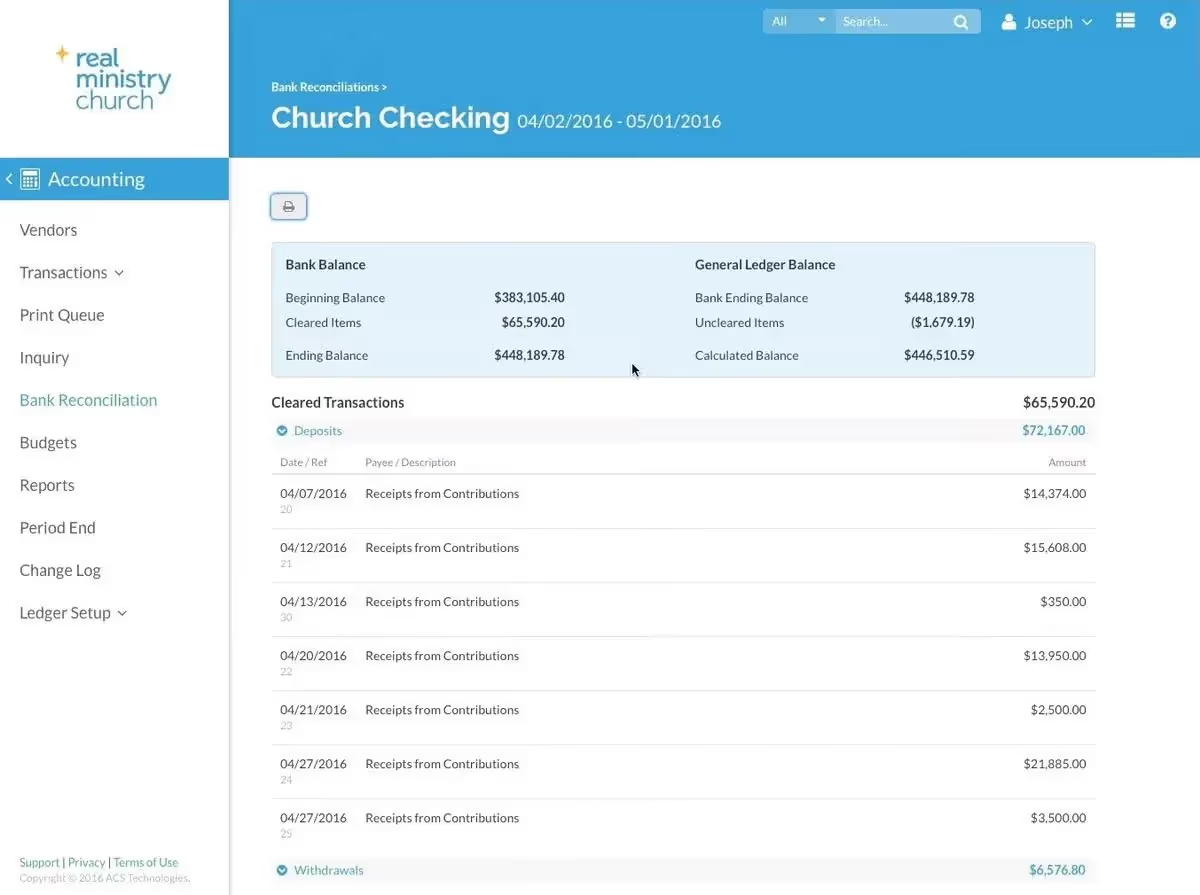
Features:
- Church-specific payroll management with tax withholding
- Employee details management and timesheet processing
- Job definition and assignment for staff roles
- Physical check printing and general ledger posting
- Custom reporting for payroll and staff management
Pros:
- Payroll and staff management features.
- It supports small breakout sessions.
- It’s integrated with other church management tools.
Cons:
Here are some drawbacks of using Realm, according to users on G2:
- Some of the features are too complex for the average volunteer to use.
- Users are unable to attach more than one file in one message.
- Push email notifications don’t work sometimes until you open the app.
Pricing:
Realm offers three plans — Inform, Connect, and Multiply — but there’s no pricing information on their website.
12. Quicken
Best for: Personal finance management and budgeting
Quicken is a finance software built to simplify financial management. It has different plans for personal and business use, each with varying features and pricing. Quicken is available on mobile, web, Mac, and Windows. However, depending on your plan, you may only have access to using Quicken on your mobile device or the web.
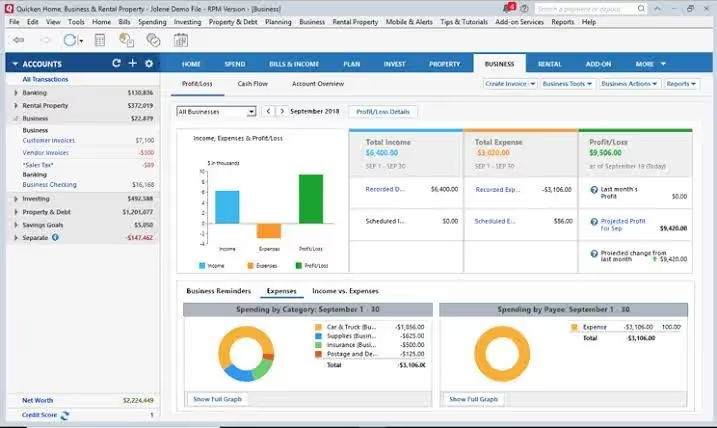
Features:
- Financial management, budgeting, and spending tools
- Syncs with user bank accounts
- Customizable financial views and reports
- Real-time alerts and insights
- Investment tracking and tax reporting
Pros:
- It syncs with over 14,000 financial institutions.
- Users can set limits for their chosen spending category and get alerts when they surpass their limit.
- It has editable invoice templates.
Cons:
Despite its benefits, users experience some difficulties using the platform, according to G2 reviews:
- Regular upgrades on the platform disrupt workflow.
- Data synchronization and update speed can be slow sometimes.
- Users are unable to modify report formats and structure.
Pricing:
- Quicken Simplifi: $3.99/mo
- Quicken Classic Deluxe: $5.99/mo
- Quicken Classic Premier: $7.99/mo
- Quicken Business and Personal: $10.99/mo
How to choose the best accounting software for nonprofits
Choosing the best accounting software for nonprofits is less about choosing a platform with tons of features and more about selecting a platform that serves your team’s needs. Here are a few things to look out for:
- User-friendly interface and accessible modules for users with moderate levels of accounting knowledge
- Cost-effective solution that fits your needs
- Ease of scale so you don’t have to switch platforms as your client base grows
- Strong financial reporting capabilities for transparency and compliance
- Embedded or integrated with the ERP and CRM tools you already use
- Reliable customer support with quick response time
More about the best accounting software for nonprofits
Are you interested in learning more about accounting software for nonprofits? Here are the answers to some frequently asked questions.
What accounting software do most nonprofits use?
There are many accounting software that offer ease of use and support for nonprofit-specific needs like fund accounting and donation tracking. But if you want more robust and scalable accounting software, opt for NetCash or NetClose. These solutions offer real-time cash management with automatic reconciliation for bank transactions and automated month-end processes.
Is QuickBooks free for nonprofits?
QuickBooks is not free for nonprofits, but Intuit offers discounts to eligible nonprofits through their QuickBooks Online service.
Is Quicken good for nonprofits?
Although Quicken is mainly for personal finance management, very small nonprofits can utilize it. However, it lacks the robust features necessary for most nonprofit organizations, such as fund accounting and donor management.
Choose the best accounting software for your nonprofit
Implementing the right accounting software for your nonprofit can save time, streamline processes, and enhance financial management. However, it's crucial to choose software that meets your specific needs, rather than deciding based on price alone.
Unsure where to begin? Consider Netgain.
Netgain offers a comprehensive suite of software options tailored to nonprofits, including lease accounting, cash management, and month-end close management solutions. It also powers the automation of several accounting processes such as invoice processing and reconciliations, freeing up time for strategic analysis rather than repetitive manual accounting.
Additionally, Netgain provides access to consolidated accounting technology embedded in NetSuite, offering a single source of truth and reinforcing data integrity. Founded by Big Four accountants, Netgain understands the unique challenges accountants face and provides expert guidance and support tailored to their needs.
To learn more about how Netgain can support your nonprofit's financial management, schedule a demo today!





.avif)